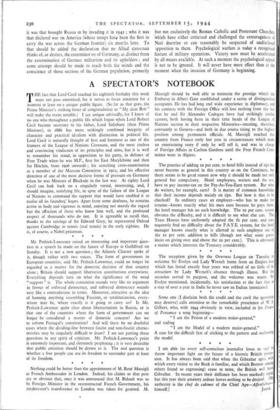A SPECTATOR'S NOTEBOOK
THE fact that Lord Cecil reached his eightieth birthday this week must not pass unnoticed, for it serves to focus attention for a moment at least on a unique public figure. (So far as that goes, the Prime Minister's striking letter of congratulation to " My dear Bob " will make the event notable.) I say unique advisedly, for I knew of no one who throughout a public life which began when Lord Robert Cecil became secretary to his father, Lord Salisbury (then Prime Minister), in 1886 has more strikingly combined integrity of character and practical idealism with distinction in political life. Lord Cecil is naturally thought of first and foremost as one of the framers of the League of Nations Covenant, and the most tireless and convincing vindicator of its principles and aims, but it is well to remember his stand, in opposition to his party, in defence of Free Trade when he was M.P., first for East Marylebone and then for Hitchin, from 1906 onwards ; his searching cross-examination as a member of the Marconi Committee in 1912, and his effective direction of one of the most decisive forms of pressure on Germany when he was Minister of Blockade in the last war. At eighty Lord Cecil can look back on a singularly varied, interesting, and, I should imagine, satisfying life, in spite of the failure of the League of 'Nations to command the support that would have enabled it to realise all its founders' hopes. Apart from some deafness, he remains active in body and vigorous in mind, enjoying not merely the regard but the affection of those who know him well, and the profound respect of thousands who do not. It is agreeable to recall that, thanks to the tutelage of Sir Edward Grey, he represented Oxford against Cambridge in tennis (real tennis) in the early eighties. He is, of course, a Nobel prizeman.
* * *






















 Previous page
Previous page